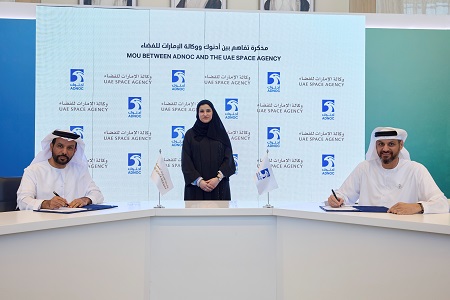The USE Space Agency has highlighted key projects and contributions in developing software and solutions to overcome national and global challenges.
 The UAE Space Agency participated in the first-of-its-kind UAE Climate Tech, held at the Abu Dhabi Energy Center on May 10 – 11, 2023.
The UAE Space Agency participated in the first-of-its-kind UAE Climate Tech, held at the Abu Dhabi Energy Center on May 10 – 11, 2023.
The participation comes as a part of the UAESA’s vision to promote sustainability efforts and aimed to showcase the latest projects and contributions in developing software and solutions to overcome national and global challenges, exchange knowledge and expertise, and explore strategic partnership opportunities with industry-leading international players.
On the sidelines of its participation, the UAE Space Agency announced phase 2 of the Space Analytics and Solutions (SAS) Programme to combat climate change. Phase 2 will include three new challenges, namely: the Air Quality challenge to monitor and control air pollution to achieve the targeted quality, the Infrastructure challenge to enhance infrastructure monitoring, maintenance, and operations solutions, and the Losses and Damages challenge to use satellite data to track and quantify the losses and damages inflicted by climate change. These challenges will offer entrepreneurs and researchers advisory and financial support to develop space applications to tackle climate change challenges.
Furthermore, the UAE Space Agency signed a memorandum of understanding (MoU) with ADNOC. The agreement promotes collaboration on research and development of satellite technology in the energy sector, launching new joint projects, and utilising space applications to increase the work efficiency of the public and private sectors.
Sarah Bint Yousif Al Amiri, Minister of State for Public Education and Advanced Technology, Chairperson of UAE Space Agency, said: “The UAE recognises the importance of innovation, technology, and space applications in mitigating the impact of climate change. To achieve this, we must expand our perspective and prioritise global cooperation and public-private partnerships to leverage our collective resources towards a sustainable future for all. The UAE Space Agency is committed to driving unique initiatives and programs in collaboration with local and global partners and the private sector to foster innovation and enhance national capabilities in environmental technology and renewable energy. This will support our comprehensive development strategy and enable us to combat climate change effectively.”
Salem Butti Salem Al Qubaisi, Director General of the UAE Space Agency, added: “The space sector, with its satellites and other advanced technologies, plays a crucial role in enabling strategic decision-making in areas such as sustainability, food security, urban planning, water resource management, and sustainable agriculture. By harnessing the power of space technology, governments and international organizations can make informed decisions to advance these critical fields. The UAE Space Agency is fully committed to supporting environmental projects and investing in cutting-edge research and development to help achieve the UAE’s vision of becoming a leading hub for innovation in climate tech.”
During its participation, the UAE Space Agency utilised smart screens and miniatures to showcase its achievements, projects, and initiatives launched to support sustainability and combat climate change. The UAE Space Agency showcased the Space Data Centre, one of the transformational projects which have had a major impact on all industries over a short period of time to ensure the implementation of the UAE’s government’s new work plan, while transforming the governments workflow to promote efficiency and competitiveness. The Space Data Center accelerates the realisation of a competitive innovation ecosystem to achieve the objectives of We The UAE 2031 vision, positively impacting society and various industries.
The UAE Space Agency highlighted Geospatial Analytics Platform-Space Data Center, which provides scientists, scholars, public and private entities, start-ups and community members with access to satellite data to help develop space applications and value-added services (VAS). Additionally, the UAESA showcased the partnership with Bayanat, the platform developer and operator, as part of the UAE Space Agency’s vision to build an innovative ecosystem to utilise space data and technologies to address global sustainability challenges, promote public-private partnerships, and expand local and international agreements.
The visitors were also introduced Space Analytics and Solutions (SAS) Programme and its key projects, which includes several initiatives in the fields of food security, greenhouse gases monitoring, environmental and vegetation monitoring, and infrastructure. They were also briefed on the Climate Change Challenge and the next phases of utilising satellite data to innovate new scalable solutions, to support agricultural and environmental efforts and face the challenges of food security and climate change. The results of the Space Analytics and Solutions (SAS) Programme challenges will be shared at COP28, hosted by the UAE in November 2023, as well as deploying all developed space applications on the Geospatial Analytics Platform – Space Data Center marketplace.












































































